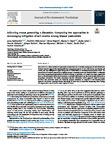Informing versus generating a discussion: Comparing two approaches to encouraging mitigation of soil erosion among Maasai pastoralists
| dc.contributor.author | Rabinovich, A | |
| dc.contributor.author | Zhischenko, V | |
| dc.contributor.author | Nasseri, M | |
| dc.contributor.author | Heath, SC | |
| dc.contributor.author | Laizer, A | |
| dc.contributor.author | Mkilema, F | |
| dc.contributor.author | Patrick, A | |
| dc.contributor.author | Wynants, M | |
| dc.contributor.author | Blake, William | |
| dc.contributor.author | Mtei, K | |
| dc.contributor.author | Ndakidemi, P | |
| dc.date.accessioned | 2022-12-08T15:39:17Z | |
| dc.date.available | 2022-12-08T15:39:17Z | |
| dc.date.issued | 2022-12 | |
| dc.identifier.issn | 0272-4944 | |
| dc.identifier.issn | 1522-9610 | |
| dc.identifier.other | 101885 | |
| dc.identifier.uri | http://hdl.handle.net/10026.1/20056 | |
| dc.description.abstract |
Soil erosion is a critical problem for pastoralist societies that rely on healthy grazing land for their livelihoods. Previous research suggests that unsustainable land management practice is one of the factors exacerbating soil erosion, and that willingness to adjust this practice is closely linked to community land protection norms. The present research explores approaches to building stronger community norms and intentions linked to mitigating soil erosion among Maasai pastoralists in Northern Tanzania. In particular, we compare two impact approaches based on the information deficit model (exposure to scientific information) and the social identity framework (a group-based discussion). The results demonstrate that the information deficit approach results in stronger perceived land protection norms and, indirectly, stronger intentions, as compared to the discussion-based approach. We discuss contextual features that should be taken into account when interpreting these findings and suggest these may be key for impact approach choices. | |
| dc.format.extent | 101885-101885 | |
| dc.language | en | |
| dc.language.iso | en | |
| dc.publisher | Elsevier BV | |
| dc.subject | Soil erosion | |
| dc.subject | Information deficit model | |
| dc.subject | Group norms | |
| dc.subject | Group identification | |
| dc.subject | Pro-environmental action | |
| dc.subject | Sustainable land management | |
| dc.title | Informing versus generating a discussion: Comparing two approaches to encouraging mitigation of soil erosion among Maasai pastoralists | |
| dc.type | journal-article | |
| dc.type | Journal Article | |
| plymouth.author-url | https://www.webofscience.com/api/gateway?GWVersion=2&SrcApp=PARTNER_APP&SrcAuth=LinksAMR&KeyUT=WOS:000884140000001&DestLinkType=FullRecord&DestApp=ALL_WOS&UsrCustomerID=11bb513d99f797142bcfeffcc58ea008 | |
| plymouth.volume | 84 | |
| plymouth.publication-status | Published | |
| plymouth.journal | Journal of Environmental Psychology | |
| dc.identifier.doi | 10.1016/j.jenvp.2022.101885 | |
| plymouth.organisational-group | /Plymouth | |
| plymouth.organisational-group | /Plymouth/Admin Group - REF | |
| plymouth.organisational-group | /Plymouth/Admin Group - REF/REF Admin Group - FoSE | |
| plymouth.organisational-group | /Plymouth/Faculty of Science and Engineering | |
| plymouth.organisational-group | /Plymouth/Faculty of Science and Engineering/School of Geography, Earth and Environmental Sciences | |
| plymouth.organisational-group | /Plymouth/REF 2021 Researchers by UoA | |
| plymouth.organisational-group | /Plymouth/REF 2021 Researchers by UoA/UoA14 Geography and Environmental Studies | |
| plymouth.organisational-group | /Plymouth/Research Groups | |
| plymouth.organisational-group | /Plymouth/Research Groups/Marine Institute | |
| plymouth.organisational-group | /Plymouth/Users by role | |
| plymouth.organisational-group | /Plymouth/Users by role/Academics | |
| plymouth.organisational-group | /Plymouth/Users by role/Researchers in ResearchFish submission | |
| dcterms.dateAccepted | 2022-10-01 | |
| dc.rights.embargodate | 2022-12-10 | |
| dc.identifier.eissn | 1522-9610 | |
| rioxxterms.versionofrecord | 10.1016/j.jenvp.2022.101885 | |
| rioxxterms.licenseref.uri | http://www.rioxx.net/licenses/all-rights-reserved | |
| rioxxterms.type | Journal Article/Review |


